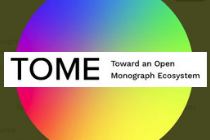UMD Libraries is pleased to announce the recipients of the inaugural TOME@UMD grants:
- Siv B. Lie, Ph.D., of the School of Music and her work, Django Generations: Hearing Ethnorace, Citizenship, and Jazz Manouche in France;
- Mauro Resmini, Ph.D., of the School of Languages, Literatures and Cultures and his work, Italian Political Cinema;
- Thurka Sangaramoorthy, Ph.D., of the Department of Anthropology and her work, Immigration and the Landscape of Care in Rural America;
- Thomas Zeller, Ph.D., from the Department of History and his work, Consuming Landscapes: What We See When We Drive and Why It Matters.
The TOME@UMD (Toward an Open Monograph Ecosystem) grant program sponsors the publication of open access, digital monographs of UMD faculty members.
Scholarly monographs are detailed written accounts of research in specialized subjects, and are especially critical in the dissemination of knowledge in the arts, humanities, and social sciences disciplines.Publishing open access monographs removes access barriers and allows for research to be used freely by anyone.
All UMD faculty members were invited to apply and submissions were evaluated on the potential impact of their work both in their field and beyond academia; the benefits of the open access distribution for their work; and the potential to enhance equity, diversity and inclusion in the production and dissemination of knowledge.
TOME is a national initiative to advance open-access (OA) publishing of monographs in the humanities and social sciences. TOME’s goal is to make this important scholarship available to readers across the globe, without cost and access barriers.
TOME@UMD is led by the University Libraries in partnership with the Office of the Senior Vice President and Provost, and the College of Arts and Humanities.






